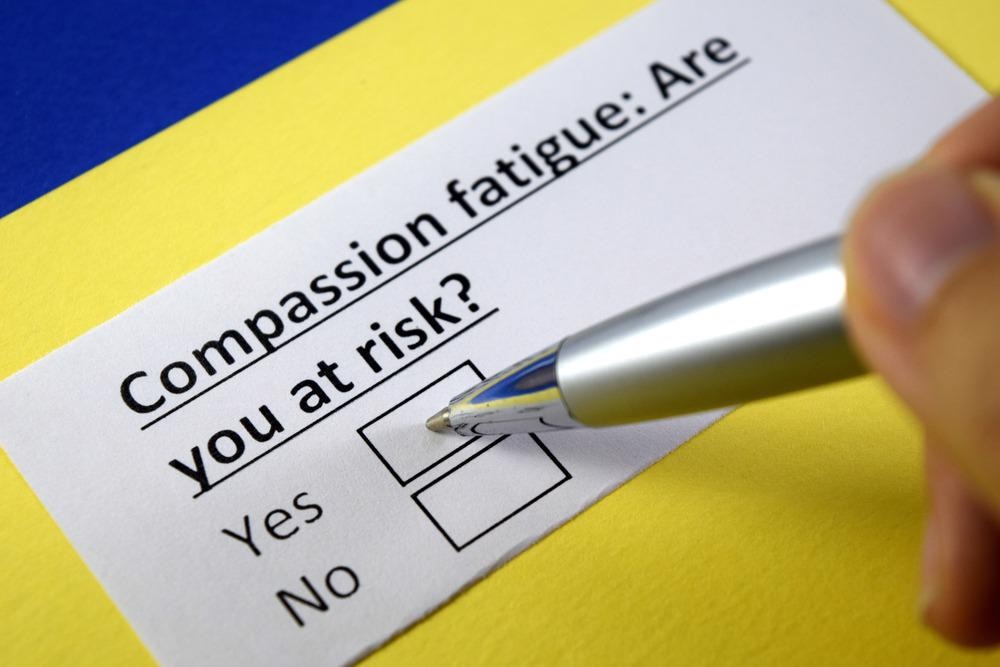Introduction
What are the Reasons for Compassion Fatigue?
What are the Risk Factors for Compassion Fatigue?
Preventing and Managing CF
References
Compassion fatigue – what is it? This term is being used frequently, in the backdrop of the ongoing coronavirus disease 2019 (COVID-19) pandemic, with millions of people hospitalized over a few months during many successive waves of the pandemic. It refers to "a state of exhaustion and dysfunction biologically, psychologically, and socially as a result of prolonged exposure to compassion stress and all it invokes."
Coetzee and Klopper describe it as "a loss of the nurturing ability that is vital to compassionate care. The essential issue of the caring professionals is to deliver themselves; being present and empathic. If this process stagnates, the emotional price of caring can become a burden in personal life, manifested by emotional distress such as CF."
Here, secondary stress due to trauma combines with cumulative burnout – the inability to deal with everyday tasks, responsibilities, and surroundings due to mental and physical exhaustion.
The people who are most in contact with traumatized people and exposed to their traumatic experiences are at the highest risk of compassion fatigue (CF). This includes doctors, emergency workers, community care and social workers, and other healthcare and service workers. The effects include poor relationships with colleagues, deteriorating standards of patient care, and mental ill-health, including post-traumatic stress disorder (PTSD), anxiety, and depression.

Image Credit: H_Ko/Shutterstock.com
What are the Reasons for Compassion Fatigue?
The reasons for this condition among these workers arise in the cost of showing empathy for and compassion towards those who they serve. The price of vicariously participating in the trauma of their clients or patients and helping resolve it puts the care provider's health and mental equilibrium at risk and endangering their safety. This risk extends to their families and employer organizations as well.
This secondary traumatic stress (STS) occurs as a frequently intense state of being preoccupied with the pain and distress of their clients. When it accompanies burnout, the result is anger, extreme fatigue, and irritable behavior. The caregiver may take up drug or alcohol use to dull the pain. They may become numb to pain, showing a lack of sympathy or empathy.
No longer do they enjoy working with and helping their former clientele. They take excessive time off work and find it hard to decide how best to care for those they serve.
The more direct the contact with the victim of trauma, especially when the exposure to the trauma is explicit and detailed, the greater its negative impact. Due to the increased incidence of depression, anxiety, PTSD, and other mental ill-health conditions, absenteeism, claims for psychological injury, job turnover, and reduced productivity are all likely to increase.
Burnout is due to failure to achieve one's goals in caregiving, causing a sense of loss of control, frustration, a tendency to work still harder to bring about the desired outcome, and lower morale. STS, conversely, is another type of coping strategy in the face of such exposure, occurring because the client or patient is harmed despite the caregiver's efforts. This leads to feelings of guilt and distress.
Both burnout and STS end in CF unless this is mitigated by compassion satisfaction (CS). This refers to resilience, the feeling that one has done what was possible, and the ability to throw off the guilt for the failures. Both negative and positive components are thus present in CF, including hyper-vigilance, avoidance, fear, and intrusion, along with exhaustion, fatigue, and depression.
What are the Risk Factors for Compassion Fatigue?
CF may be triggered by taking care of patients at risk of death or giving useless or palliative care in such situations. The strain of witnessing constant suffering, making end-of-life decisions in consultation with distressed and confused relatives, and maintaining constant alertness while dealing with high-technology medical equipment.
Caregivers on physically demanding or emotionally strenuous tasks are also at risk. Having to work overtime or extra work days is also a risk factor. Besides the intense workload, getting too little time to rest between shifts, repetitive tasks, not having a sense of agency or control, and dissatisfaction with the job all relate to employment-linked CF risk.
In addition, poor support by managers and not being recognized for one's contribution lead to a higher employer-linked risk of CF.
Caregivers with empathy are at risk for CF as they can identify with the patient's feelings when coupled with poor resilience. Long-term exposure to overwhelming care needs results in a defensive dulling of empathy, leading to CF.
There is an urgent need to understand what drives CF to help caregivers stay healthy, gain resilience, and thus regain a level of high function at work or elsewhere when dealing with traumatized patients or clients. Premature loss of workers from such occupations may lead to less skilled and trained workers entering these workplaces. The increased stress this puts on the latter promotes the development of CF among them, in turn.

Image Credit: Yeexin Richelle/Shutterstock.com
Preventing and Managing CF
CF's warning signs may include physical symptoms (headaches, sleep disruptions, stomach problems, and low back pain) and mental distress signaled by unstable mood, hostile or irritable responses, and a loss of self-confidence. Cognitive impairment, such as loss of memory, poor focus, difficulty in thinking clearly and making decisions, and an increased tendency to worry, may also emerge. Behavioral symptoms include lethargy and poor stamina, frequent weeping spells, substance or alcohol abuse, self-isolation, or risky behavior.
The presence of CF could lead to moral distress or avoidance behavior, cause workers to begin to hate their jobs and become absentees, or even leave the profession prematurely. This draining away of brainpower and skills could lead to economic harm and poor quality of care for patients and their families in distress.
Since at-risk occupational groups can be identified, it is recommended that such workers be offered programs to help build resilience, which seems to be the key to avoiding CF by promoting a sense of agency and self-worth. Becoming aware of one's trigger points, sharing experiences with others similarly affected to learn from them, putting in place strategies to reduce such intense triggering of negative emotions such as hopelessness and frustration, and encouraging compassion towards oneself as well as the worker are some skills that need to be imparted to workers in such areas.
One such program includes self-care skills, building a network of connections for support, becoming more intentional rather than reacting to situations, controlling one's internal and external activity to regulate autonomic activity, and learning to perceive situations maturely, both in one's own self and towards the workplace.
Communication training could facilitate better interactions with patients and relatives and reduce conflicts with colleagues and employers. This could also help express empathy for patients and clients better, which in turn fosters feelings of self-efficacy, improved care, and a better sense of well-being.
This relatively new concept needs to be explored with more research to quantify the risk of future ill-health such as depression or anxiety due to CF in workers, independent of other risk factors; determine the intervention or combination of interventions that can reduce CF; and evaluate the financial benefits of such interventions as investments in the well-being and productivity, and ultimate profitability, of the care organization or employer, in addition to the obvious moral and legal obligations to do so.
References:
Further Reading
Last Updated: Jun 1, 2022